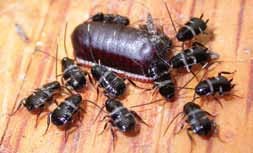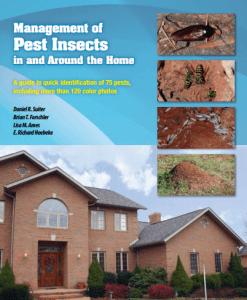Pest Management
Taken from the UGA publication Management of Pest Insects in and Around the Home by Daniel R. Suiter, Brian T. Forschler Lisa M. Ames and E. Richard Hoebeke
The origin and extent of a pest infestation is often associated with one or more conditions that promote the survival and reproduction of that particular pest. Those conditions include:
- Favorable temperatures,
- Abundant food and water, and
- Available shelter or harborage
When pest problems occur there is usually one or more of these requirements readily accessible to the pest.
The preferred living environment for most humans also provides the necessities many pests need to satisfy their life support requirements. Therefore, it is important that homeowners limit pest access to potential sources of food, water, and shelter in and around the home in an effort to keep our personal living space inhospitable to unwanted house pests.
Proactive pest management is a process that begins with identifying the pest and using information on the biology of the offending creature to decide upon a plan of action. The action plan should involve interventions aimed at reducing pest population numbers or the chance for future encounters with that pest.
Proactive pest management interventions will vary from one household or business to the next but there are a few overarching themes worthy of comment. (Editors note: We discuss access to food in this article. For information on other proactive pest management refer to the publication Management of Pest Insects in and Around the Home)
Food
General rules of cleanliness during food preparation, storage and disposal is the logical starting point for helping to resolve and prevent certain pest problems. Denying pests access to food is an important component of making our living environment less hospitable to pests.
 Important practices (habits to establish) that may limit insect access to food include, but are not limited to:
Important practices (habits to establish) that may limit insect access to food include, but are not limited to:
- Keep food in tightly sealed containers;
- Keep bird food in feeders, as rodents may use spilled food as a food source (Figure 1);
- Rotate (use) boxed or packaged foods every 1-2 months;
- Clean up spills that occur during food preparation or handling;
- Do not keep soiled dishes in the sink or dishwasher overnight;
- Empty indoor garbage receptacles twice per week, at a minimum;
- Clean garbage disposals at least once a week;
- Keep outdoor garbage in a tightly sealed container and away from any dwelling entrance;
- Rinse recyclable containers prior to recycling;
- Store birdseed in a tightly sealed container, preferably outside and away from doors;
- Ensure that discarded plant waste is removed twice per week, at a minimum, especially during the summer (Figure 2).
For more information on Proactive Pest Management see Management of Pest Insects in and Around the Home
About the Authors
Daniel Suiter (dsuiter@uga.edu) and Brian Forschler (bfor@uga.edu) are Professors of Entomology, specializing in urban entomology, in the Department of Entomology at the University of Georgia; Suiter is located on the university’s campus in Griffin, while Forschler is on the main campus in Athens, Ga.
Lisa Ames (lames@uga.edu) directs the Homeowner Insect and Weed Diagnostics Laboratory on the UGA Griffin Campus.
Richard Hoebeke, a systematic entomologist, is the associate curator of insects at the Georgia Museum of Natural History on the UGA’s main campus in Athens, Ga (rhoebeke@uga.edu).

